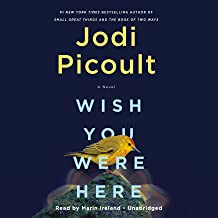
Wish You Were Here by Jodi Picoult
(2021. Random House. Audiobook.)
Jodi Picoult has crafted an engaging read in her latest effort. Wish You Were Here is the first person story of New Yorker Diana O’Toole scheduled to spend an amazing vacation in the Galapagos Islands with her live-in boyfriend, circa March 2020. As the plot unfolds, the boyfriend, a surgical resident named Finn, is about to propose marriage but COVID begins to wreck havoc on the city, compelling Finn to postpone the big announcement, remain at the hospital, and urge the protagonist to “Go. You deserve this trip.”
And so, Diana travels to South America and lands smack dab in the pandemic which, once she declines to take the last boat off the island she’s scheduled to stay on, leaves her stranded in a place without luggage (lost by the airline) with no idea of how to speak the language, and, most important of all, without lodging or food since her prepaid hotel reservation has been cancelled due to the virus. The place is closed up tight, forcing a woman trained as an art expert at Sotheby’s to confront a world that she has little ability to negotiate. That’s the gist of the first half of the novel. I can’t, without divulging a major plot twist integral to the second portion of this fine read, tell you what comes next for Diana.
René and I listened to the audio version of the book on our drive to Arizona and loved it. Some commentators/reviewers on Amazon find the author’s pro-vaccine message too large a pill to swallow. I’ve faced similar criticism from readers regarding the last book of my Finnish American Trilogy, Kotimaa: Homeland where at least one reviewer wrote that he “enjoyed the book but the last third needs re-writing because politics has no place in novel.” Really? I’m certain you, as well as I, can recount any number of masterpieces of storytelling written throughout history that rely upon a political viewpoint to get a fictional story’s message across. As a proud believer in science over manipulation, I applaud the author for her insertion of common sense and medical truth into this fictional tale.
An enjoyable read.
4 stars out of 5
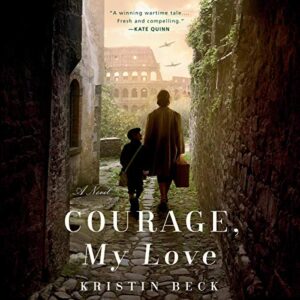
Courage, My Love by Kristin Beck
(2021. Berkley. Audiobook version)
Kristin Beck is writing here about a timeframe few of us consider regarding WW II: the period after Mussolini fell and before the Americans and their allies drove the Germans out of Italy. That alone intrigued me, a history buff and writer of historical fiction. But Beck does far more than give us the history of what transpired when El Duce abdicated his power.
In the most fundamental of ways, Courage is the story of two young Italian women. Lucia Columbo, a single mother whose husband disappeared in the post-Fascist era and who, though largely apolitical herself, eventually comes to terms with her nation’s failings and decides she can no longer sit on the sidelines while her beloved Italy is engulfed by the fierce evil of Nazi control.
Francesco Gallo, who, as a child suffered from polio leaving her with a distinctive limp, and who recognized early on the failings of Mussolini’s vision, is quicker to the realization that she, along with others, must stand up against the Germans. Rome is inundated with German troops, the hated SS, and the feared Gestapo when these two brave young women risk everything to oppose what Lucia’s parents, and other supporters of Mussolini and his German partner, consider to be Italy’s last chance to regain the glories of imperial Rome.
It is a curious thing to me, an author of two novels centered on the history, struggles, and heroism of World War II (The Legacy set in Yugoslavia; and Sukulaiset: The Kindred set in Finland, Estonia, and Russia) to see a resurgence of interest in the many facets of the world’s most deplorable and disastrous war. Perhaps this is occurring because eyewitnesses to such history are slowly fading to dust. Beck’s attempt to join clarion voices retelling stories from that time in new and enlightening fashion. If you enjoyed, All the Light We Cannot See, The Nightingale, and a host of more recent novels chronicling this period in history, you’ll enjoy Beck’s work here.
Well done.
4 and ½ stars out of 5
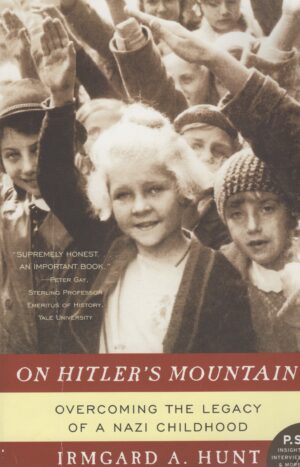
On Hitler’s Mountain by Irmgard A. Hunt
(2005. Harper. ISBN 978-0-06-053218-5)
Confession time again. I didn’t buy this book. It was loaned to me by my buddy, Dave Michelson. He knows how much I love history and especially, WW II history, so he handed me the book in Arizona when we were camping together on the banks of the Verde River.
This rather slender volume doesn’t pretend to explain how an entire nation of relatively educated citizens was dragged into madness and the Holocaust. Rather, the author, who was born into the Hitler regime, focuses on her own personal understanding, as a young girl, of how her own family, including her mother and father, virtuous though not necessarily church-going German Lutherans living at the base of what would become Hitler’s Eagle’s Nest, cast their lot with a brutal, sociopath who surrounded himself with like personalities to rule and, eventually, ruin, Germany. I applaud Ms. Hunt’s attempt but the problem is very simple: attempting to chronicle the mesmerization of an entire people by an intimate look at one particular family, while illuminating on the micro level, leaves one unsatisfied in the end.
There’s no doubt that, given the Treaty of Versailles and the ruination of the German economy that followed, Ms. Hunt’s family suffered poverty, hunger, and deprivation sufficient for her parents to turn towards Nazism. Her maternal grandfather, on the other hand, knew, from day one, who and what Adolph Hitler was. The internal struggles in the author’s family, how far to accede to Nazism, who to denounce, who to trust, who to protect, all make for a fine story of familial angst. But the broader, more important question of why no one possessing a sniper’s rifle or a hand grenade or a pistol tried to end the madness early on remain untouched. Oh, there’s a mention here or there of suspicious activity by the SS or the Gestapo: a neighbor girl who had Down Syndrome, rumors of maltreatment of Jews, that tie into the larger story of Nazi evil. But in the end, there’s simply not enough personal flagellation by the author, who immigrated to America and became a successful advocate for the environment, for this reader to find the book compelling.
3 stars out of 5. Interesting but not earth shattering.

Venice by Jan Morris
(1993. Faber. ISBN 0-571-16897-3)
Okay. This one, I actually bought in the title’s namesake city when we visited in 2019. I was surprised, when I began reading Ms. Morris’s slender guide to the history and places of interest in one of the world’s most romantic and mysterious cities, to find out I’d read the author before. A few chapters in, I decided to do a search the internet regarding Jan Morris’s background. Turns out, she’d once written the iconic history of Britain, Pax Britanica, a massive three-volume work I’d read years ago when I belonged to the Quality Paperback Book Club. (Googling QPBC it seems to be no longer in operation.) But that terrific series was penned by Ms. Morris when she was Mr. James Morris. Oh well, who am I to judge? On with the review.
Much of the book is a travelogue of Venice proper and the islands of the lagoon surrounding and, over history, protecting Venice from weather and invaders. The author candidly discusses changes she’s noted in Venice since her first visit in the early 1960s through the 1990s. Morris thoughtfully comments upon climate-related threats to the city, but does not seem alarmed over the survival of one of the world’s great historic locales.
I wish I’d read this volume before my trip. I would have appreciated what I was seeing all that much more. My only criticisms of the book are that it is, by its very nature, dated, and that it gets a bit sluggish in the middle sections where Morris hashes out all the comings and goings of the various regimes throughout history. Still, the book is a valuable asset to anyone walking the cobbled streets of this iconic city intersected by canals.
4 stars out of 5. Valuable if a bit behind the times.
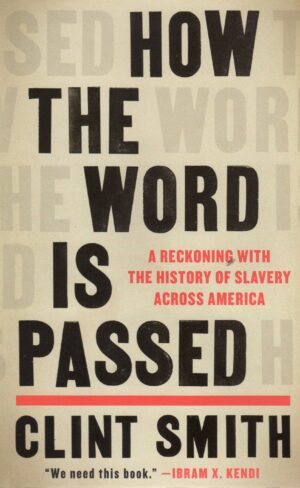
How the Word is Passed by Clint Smith
(2021. Little Brown. ISBN 978-0-316-49293-5)
Simply the best book post-George Floyd to come along and tackle the sensitive and difficult topic of race in America. Not that talking about heritage and race and religion should be difficult in a land filled, with the exception of our Native brothers and sisters, immigrants. We all have a story to tell regarding where our ancestors came from. Except, in the case of most African Americans, their forefathers and foremothers did not arrive on the shores of North and South and Central America by choice: they were brought here as chattel slaves, a term I’ve never used but, after reading Smith’s excellent inquiry into where we are as a nation, will use from now on.
This is a journey, not only of place, but of heart. Smith, a well-respected essayist and poet, walks the grounds where chattel slavery began, flourished, had an impact, or left its indelibly sad and cruel imprint. We meet folks along the way, including white millionaire John Cummings who purchased Whitney Plantation in Louisiana as an investment only to decide, upon researching the institution of chattel slavery as it existed at Whitney, to turn the place into an interpretive center where folks of all walks of life, ethnicities, and origins can visit and obtain a fundamental understanding of slavery. Smith walks Monticello, not in search of the greatness of Thomas Jefferson, but to discover Jefferson, the man who penned the Declaration of Independence’s creed, “All men are created equal …” as a slave owner.
I could go on and on regarding the places this honest, candid, and at times, disheartening (such as when Smith interviews modern-day Southerners about the “Lost Cause”) read takes readers. But all that really needs to be said is that America has not healed, has not put the Civil War in its rearview mirror: not if millions of folks believe the South seceded to protect some vague notion of “states’ rights”. Smith makes it clear the Civil War came about, not as a means to preserve statehood independence, but solely and completely and absolutely to keep chattel slavery alive as an American institution. It’s as simple as the color of our skins.
5 stars of 5. Should be required reading in every high school in America.

The Fall of Richard Nixon by Tom Brokaw
(2019. Random House. ISBN 978-0-593-13440-5)
I’ll keep this short, like the book. I deeply respect Tom Brokaw as one of America’s sage, preeminent, television journalists. I’m happy to have a signed copy of this book as a commemoration of all the good work Tom has done over the airwaves throughout my youth and into my old age. However, this book really doesn’t add much, other than Brokaw’s personal connections to the Watergate story as he watched it unfold and reported upon it, to the study of Richard Nixon’s fall from grace. It’s a fairly breezy, easy to read refresher on a scandal that tore America apart and gave us, years later, Ronald Reagan and then, the Man Who Would Be King. Beyond that, it’s not the detailed, careful study of events I would have expected from Mr. Brokaw.
3 stars out of 5.
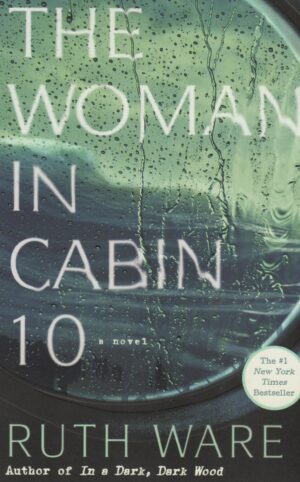
The Woman in Cabin Ten by Ruth Ware
(2016. Scout. ISBN 978-1-5011-3295-7)
I ran out of books to read while on vacation from retirement in Camp Verde Arizona, which required a trip to a bookstore. Only problem is: there isn’t a bookstore in Camp Verde or nearby Cottonwood. Which, to a book lover, is an utter shame. I was relegated to Walmart to find something to read and came away with this title.
The protagonist in this thriller/mystery is a travel writer assigned to voyage with passengers and the crew from Hull, England into the fjords of Norway on a new luxury yacht. There’s plenty of decent plotting and enough character sketching to hold one’s interest but this tale is, from the beginning, flawed by the fact, like Agatha Christie’s “killer on a train” theme, Ms. Ware must limit the number of potential murder suspects (a body is heard being tossed overboard in the middle of the North Sea) by creating a fairly implausible, very limited passenger list inhabiting an equally implausible diminutive vessel. I turned pages, for certain, and was interested in what was happening. But this is not great literature or even exceptional story-telling.
3 stars out of 5.
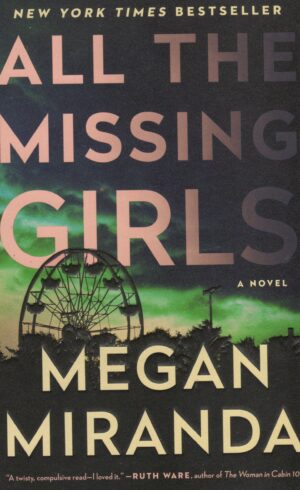
All the Missing Girls by Megan Miranda
(2016. Simon & Schuster. ISBN 978-5011-0797-9)
Another Walmart book to tide me over by the swimming pool in Arizona. This one, however, is markedly better than The Woman in Cabin Ten. This is a complex “whodunit” involving the disappearance of mercurial Corrine Prescott, sometime best friend of the protagonist, Nicolette, in rural Cooley Ridge. Nicolette, now living in Philadelphia and on the verge of marrying a young lawyer is summoned home by her brother to deal with their aging, dementia-riddled father and the family house. While home, another young girl, a quiet, shy and barely noticed teen, goes missing. It’s the unraveling of the fates of two young women who share the mystery of vanishing in the night despite a gulf of years that moves this tense, tightly drawn, very believable psychological thriller forward. A good read.
4 stars out of 5.
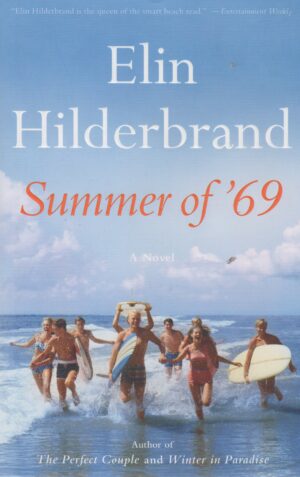
Summer of ’69 by Elin Hilderbrand
(2019. Little Brown. ISBN 978-0-316-42001-3)
The last of my desperation purchases from Wally World in Cottonwood, AZ, this is a typical Hilderbrand effort but one worth a beach read if you’re so inclined. The only major flaw, to my readerly eye, is the inclusion of the Ted Kennedy/Mary Jo narrative, a fleeting and not really needed bit of trivia that doesn’t add anything to the generational, familial tale being told. There’s plenty of sharp dialogue and a plethora of intriguing characters to keep the story moving despite this noted, minor flaw. If you’re expecting Jane Eyre or something classic and memorable, this is not the book for you. But if you are looking for a nice, cozy, easily read diversion from life, then this Hilderbrand is just the thing for poolside.
4 stars out of 5.
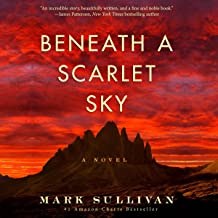
Beneath a Scarlet Sky by Mark Sullivan
(2017. Brilliance. Audio Book)
So, the world’s audience is divided on this book. According to Amazon’s Global Ratings, a majority of readers/listeners find this to be a 5 star “read”. But there’s a small, very vocal group of dissenters who give this effort minimal credit for bringing real-life Italian war hero, Pino Lella, to life. I won’t quote the bashers here. Not my place. But I will say I found it remarkable that at least one negative reviewer found this fictionalized version of the efforts of Italian partisans during the last days of Fascist Italy to save Italy’s Jews from the Nazis who replaced Mussolini, “worse than Nightingale”. Really? You hated that book as well, one of Kristin Hannah’s best works? Too bad. I loved that book. As I love this one.
Yes. I agree that the first few chapters of Beneath read like a YA novel. But in short order, the author extracts himself from a seventh-grade English class to write a riveting and well-researched story that, frankly, outshines its beginning. Those who find the heroics, daring-a-do mountain climbing, and juxtaposition of a seventeen-year-old Catholic boy alongside a German general as the officer’s driver didn’t bother reading or listening to the book’s ending, where Sullivan explains the arduous process of his research and documentation of Pino’s exploits and life. The characters, for the most part, are actual historic figures, right down to the Nazi general. Complaining the plot and characters reek of implausibility misses this hard and fact-checked truth: Beneath depicts, with some novelistic license, actual events that chronicle the cruelty, and the bravery, of humanity engaged in an horrific war.
Both my wife and I loved this book. You will too.
4 and ½ stars out of 5. But for a slow start, this is a 5-star read.


